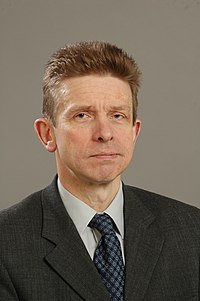Māris Grīnblats (5 January 1955 – 14 March 2021) was a Latvian politician and a member of the political party For Fatherland and Freedom/LNNK (TB/LNNK).
Māris Grīnblats | |
|---|---|
 | |
| Deputy of the Saeima | |
| Personal details | |
| Born | 5 January 1955 Kuldīga, Latvian SSR, Soviet Union |
| Died | 14 March 2021 (aged 66) |
| Political party | For Fatherland and Freedom/LNNK National Alliance |
| Alma mater | University of Latvia |
Early life
editGrīnblats was born on 5 January 1955 in Kuldīga, Latvian SSR.
From 1977 to 1982 he studied and graduated from the LVU Department of Philosophy. From 1980 to 1983, he was a sociologist of various departments of Latvian universities.
From 1988 Grīnblats was a member of the Madona branch of the Latvian People's Front (LTF), later he became its chairman. From 1989 to 1990 he was a member of the LTF Council. Grīnblats participated in the development of the Citizens' Congress of the Republic of Latvia, and in 1990 he was elected a delegate of the Citizens' Congress, where he was the Deputy Chairman of the Latvian Committee of the Citizens' Congress. From 1991 to 1993, he was chairman of the Citizens' Congress and a leader of the 18th November Union that emerged from it.
He became the founding leader of For Fatherland and Freedom (TB), a party that was created from 18 November Union, in 1993.[1][2][3]
After the 1995 parliamentary election, Grīnblats, as leader of the centre-right 'National Bloc' coalition formed around TB, was asked to become Prime Minister, but, on 23 November, he failed to get the confidence of the Saeima: falling short by one vote.[4] Instead, he became Minister for Education and Science and a Deputy Prime Minister to Andris Šķēle.[5][6]
During Grīnblats leadership of TB, it merged with Latvian National Independence Movement to form the TB/LNNK, and Grīnblats became the party's first chairman. He remained in that position until 2002, at the beginning of the 8th Saeima, when he became President of the TB/LNNK's faction in the national legislature, the Saeima, which he remained in the 9th Saeima.[1]
He ran in the 2010 Latvian parliamentary election as a member of the National Alliance list, but was not elected. Since then, he was working as a consultant of the party faction in the Saeima.
He died in March 2021.[7]
Footnotes
edit- ^ a b Ortiz de Zárate, Roberto (2009). "Leaders of Latvia". Archived from the original on 9 March 2012. Retrieved 30 July 2010.
- ^ Vance, Charles M.; Paik, Yongsun (2006). Managing a Global Workforce: Challenges and Opportunities in International Human Resource Management. M.E. Sharpe. ISBN 978-0-7656-1070-6.
- ^ Aylott, Nicholas (15 April 2016). Models of Democracy in Nordic and Baltic Europe: Political Institutions and Discourse. Routledge. ISBN 978-1-317-09481-4.
- ^ Dawisha, Karen; Parrott, Bruce (1997). The Consolidation of Democracy in East-Central Europe. Cambridge: Cambridge University Press. p. 282. ISBN 978-0-521-59938-2.
- ^ Day, Alan John; East, Roger; Thomas, Richard (2002). A political and Economic Dictionary of Eastern Europe. London: Routledge. p. 213. ISBN 978-1-85743-063-9.
- ^ Bugajski, Janusz (2002). Political Parties of Eastern Europe: A Guide to Politics in the Post-Communist Era. M.E. Sharpe. ISBN 978-1-56324-676-0.
- ^ DELFI.lv (15 March 2021). "Mūžībā devies bijušais politiķis Māris Grīnblats". delfi.lv (in Latvian). Retrieved 24 March 2021.